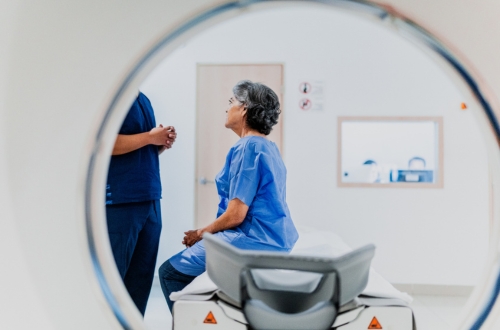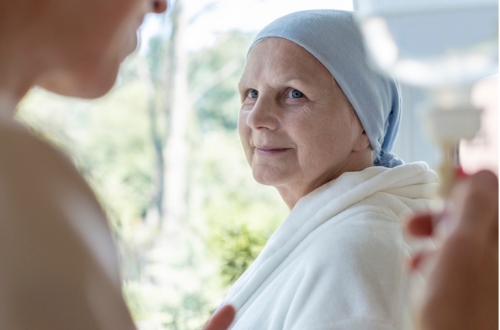Oncology Trials: Top 5 Trends to Watch
In May 2024, the IQVIA Institute for Human Data Science released their annual Global Oncology Trends report, providing an outlook for the landscape of cancer treatment from 2024 to 2028. Their key findings underscored the importance of ongoing innovation in oncology clinical trials, estimating that cancer incidence could increase by more than 12 million new cases annually to 32 million by 2050. Read the full report from IQVIA here.
Oncology is one of the most funded therapeutic areas in clinical research, and as a result of this, sponsors and CROs (contract research organizations) are maintaining a strong pace in their research and development efforts. In 2023 alone, 25 oncology novel active substances (NASs) were launched globally and over 2,000 new clinical trials began for novel drug classes, including cell and gene therapies, antibody-drug conjugates, multi-specific antibodies, and radioligand therapies.
Amidst this fast-paced evolution of oncology therapies, this article from TFS HealthScience’s Oncology CRO will highlight the top five trends to watch for in cancer clinical trials. From novel biomarkers and immunotherapy combinations to unique digital tools, continue reading to discover the exciting changes happening in the field of oncology!
1. Precision Medicine Advances: New Biomarker-Driven Oncology Clinical Trials
Precision medicine, also known as personalized medicine, is a treatment approach that is increasingly being adopted in oncology. The United States (U.S.) National Cancer Institute’s (NCI) definition of precision medicine is “a form of medicine that uses information about a person’s genes, proteins and environment to prevent, diagnose and treat disease.” The foundation of this tailored approach lies in the identification and validation of specific biological markers (e.g., genetic mutations or protein expression patterns), which can indicate whether a patient is likely to respond to a particular targeted cancer therapy.
Most recently in October 2024, the National Institutes of Health (NIH) of the United Kingdom (UK) launched their myeloMATCH precision medicine clinical trial to test the efficacy of certain targeted combination therapies against specific genetic changes seen in acute myeloid leukemia (AML) and myelodysplastic syndromes (MDS). Because these are aggressive blood and bone marrow cancers that progress quickly in patients, the NIH emphasized the importance of rapidly identifying each patient’s disease subtype with clinical trials so that treatments can be tested for their specific cancer.
Enrolled patients will undergo genetic testing, and based on their tumor characteristics, they will either join a sub-study with a treatment appropriate for their cancer subtype’s specific genetic changes, or the standard treatment arm if an appropriate sub-study is not available. As the trial continues its recruitment over the next few years, it will roll out new sub-studies to test emerging AML and MDS subtype characteristics with available targeted therapies. Read about the myeloMATCH clinical trial here to learn more!
2. Emerging Immunotherapy Combinations and Other Novel Approaches
Oncology researchers are increasingly investigating different combinations of immunotherapeutic agents or pairing immunotherapy with other approaches to overcome treatment resistance in cancer patients. Immunotherapy refers to a group of targeted cancer treatments which can help a patient’s immune system combat tumor cells more effectively. Several clinical trials are underway evaluating the efficacy of these drugs when combined with targeted therapies, chemotherapy, or radiation therapy in various cancers.
This month alone, the U.S. Food and Drug Administration (FDA) approved a combination of the immunotherapy drug, durvalumab, plus an experimental drug, tremelimumab, for people with unresectable hepatocellular cancer, the most common type of liver cancer (read the full press release here). Back in March this year, the FDA also approved the immunotherapy-class programmed cell death-1 (PD-1) ligand (PD-L1) inhibitor, tislelizumab, for treating esophageal squamous cell carcinoma (ESCC) after prior chemotherapy in second-line settings (read the full press release here).
A novel approach involving immune checkpoint inhibitors (ICIs), a type of immunotherapy, involves bi-specific antibodies (bsAbs), which are emerging as a promising approach to overcome treatment resistance. These bsAbs are designed to simultaneously engage multiple targets and enhance the immune response against cancer cells. Although still in early stages of research, some bsAbs are exploring combinations with ICIs and non-ICI therapies, such as pairing an anti-PD-L1 antibody with a therapy targeting the protein, transforming growth factor-β (TGF-β). Read more about the latest advances in immunotherapy oncology clinical trials in this Nature article here.
3. Applications of Artificial Intelligence and Machine Learning in Clinical Oncology
Not surprisingly, another key trend in oncology clinical trials is the integration of artificial intelligence (AI), specifically models driven by machine learning (ML). The advantage these technologies provide is their ability to sift through large volumes of clinical data, like those generated by clinical trials, to glean valuable insights which can inform clinical decision-making, patient recruitment, trial design choices, and more. To date, ML algorithms in oncology have mostly been used for prognostic purposes, identifying which premalignant masses might become cancerous or metastasize. However, researchers are shifting toward using predictive response modeling to help oncologists match patients to the appropriate clinical trial or treatment.
In one study out of Harvard University, an AI model, called the MatchMiner tool, was trained to identify cancer patients who have progressive disease and predict which of them were likely to require new palliative systemic therapy for potential clinical trial enrollment. The model made these predictions based on analysis of recently available imaging reports. Using the probability of a patient requiring a new treatment in the near future, the MatchMiner tool was able to identify individuals who met the tumor genomic criteria and prospectively match them to nine early-phase oncology clinical trials. This AI-assisted approach resulted in a 95% reduction in the number of patient reviews needing to be conducted by the nurse navigator each week. Learn more about this AI-based recruitment approach here!
4. Liquid Biopsies and Non-Invasive Monitoring for Oncology Patients
Liquid biopsy is defined as the collection of bodily fluids, such as blood, cerebrospinal fluid, or saliva, to assess for biomarkers that could guide treatment decisions in cancer patients. This technique is bringing in substantial interest within the field of oncological research, considering the potential information it can provide on disease prognosis, progression, and therapeutic responses.
To date, liquid biopsy assays that are currently approved by the US FDA are indicated as companion diagnostic tools for molecularly targeted therapeutics. For example, the Phase 3 PADA-1 trial enrolled patients with breast cancer who were treated with first-line aromatase inhibitor plus CDK4/6 inhibitor (palbociclib). In this trial, liquid biopsy was used to identify patients who experienced increasing levels of ESR1 gene mutations, per eligibility requirements.
Aside from these applications within clinical trials, some liquid biopsy assays are emerging to assist with early cancer detection and molecular residual disease (MRD) monitoring. For example, multi-cancer early detection (MCED) assays could offer a non-invasive alternative to screening procedures such as colonoscopies or pap smears. Similarly, following treatment with systemic therapy and/or surgery, liquid biopsies can look for the presence of circulating tumor DNA to determine MRD in oncology patients. However, these methods are not yet approved and are currently undergoing testing in clinical trials.
Interested in learning more about liquid biopsies? Read this article from the American Society of Clinical Oncology (ASCO).
5. The Potential of Decentralized Models in Next-Generation Sequencing Technology
As discussed earlier, precision oncology is a growing focus in cancer clinical trials, with the market expected to reach a projected $345 billion by 2035. However, these trials are accompanied with the challenge of reaching a small, diverse subset of patients with cancer, especially considering trial participation continues to remain low in oncology. In the U.S., it is estimated that only 2% to 8% of individuals diagnosed with cancer ever enroll in a clinical trials.
Next-generation sequencing (NGS) technology may be the solution to reducing the extent of this challenge. This technology is commercially used to analyze genetic samples from patients to determine variations in DNA or RNA sequences that could be related to diseases like cancer. Although NGS technologies are being utilized in some oncology clinical trials using a traditional approach wherein samples are sent to and analyzed at a single centralized location, decentralized deployment of this method may offer better advantages in the future.
For example, the ability to test samples on-site eliminates transportation-related delays and allows the results to be delivered within 48 hours, unlike other methods which require as long as one week. With this faster turnaround, patients can be deemed eligible or not for a precision oncology study more quickly. Decentralization also supports testing capabilities in smaller medical centers, allowing geographically diverse populations to learn of your oncology study. Overall, decentralized delivery of NGS technologies can provide rapid solutions for biomarker-driven oncology clinical trials. Read more about it in this article!
Conclusion
In conclusion, oncology clinical trials are undergoing several exciting developments with these five trends rapidly paving the way for innovations in cancer therapy. Precision oncology, genomic sequencing, AI/ML techniques, immunotherapy approaches, and the rise of liquid biopsies represent key advancements in oncology that are providing hope to researchers, patients, and their families of the future. As cancer clinical trials increasingly adopt more personalized, data-driven, and patient-friendly approaches, emerging cancer therapies can be expected to not only improve disease burden, but also quality of life in this highly vulnerable population.
To gain more insights about what global oncology trends to expect in the coming years, visit this 2024 report from IQVIA!
TFS: Your Oncology CRO Partner
TFS HealthScience Oncology and Hematology CRO is dedicated to providing comprehensive services to support your oncology clinical trials. With a proven track record of over 300 cancer-related clinical trials across all phases, we’re committed to delivering solutions that match your needs. Our global operations teams are fully experienced with navigating the complex landscape of cancer clinical research, offering rigorous operational oversight and adherence to global standards. Visit our oncology CRO website to learn more or connect with a TFS representative here!
Interested in more Oncology and Hematology CRO content from TFS? Visit our Intellect Hub here to access white papers, articles, case studies, and more!
Connect with Us
Contact us today to discover how TFS can be your strategic CRO partner in clinical development.


